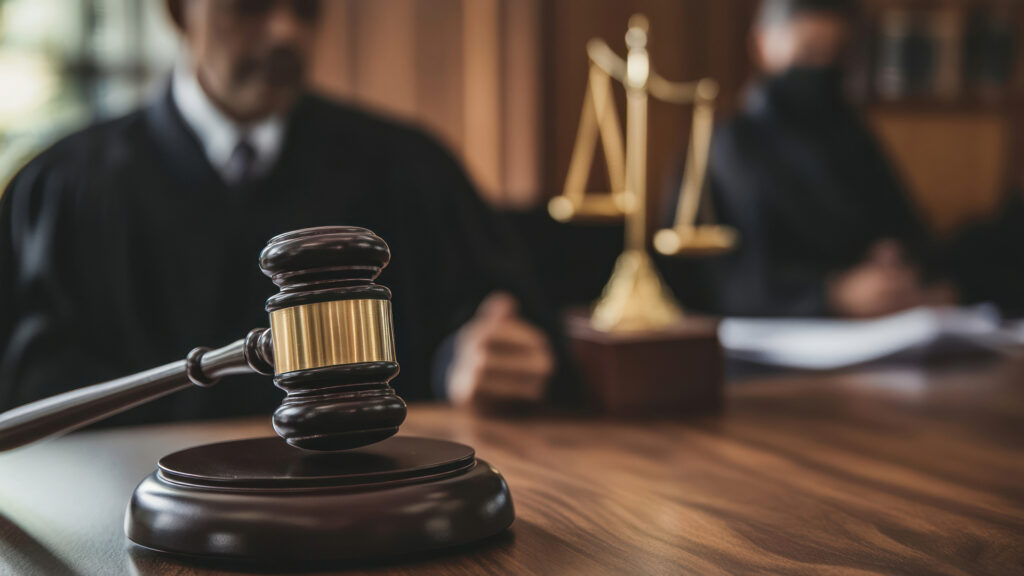Small claims cases offer a practical, accessible way to resolve disagreements over modest sums of money, typically under $8,000. The exact limit can vary depending on your state. Small claims court is designed to help everyday people settle disputes quickly and affordably, without the formalities of higher courts.
These cases often involve disputes between neighbors, property damage, and consumer complaints. Common examples include damaged fences, unpaid repair bills, unsatisfactory services, or issues with purchases. Landlord-tenant disagreements, small contract disputes, and debt collection are also frequently handled in this setting.
However, small claims courts usually cannot issue injunctions or other types of court orders that tell someone to start or stop doing something. They’re mostly limited to awarding money, not forcing action or inaction.
While small claims court is intended to be user-friendly and not require an attorney, the process can still feel overwhelming. Filing paperwork, gathering evidence, and presenting your case in front of a judge can be stressful if you’re unfamiliar with legal procedures.
The good news is that getting the right information and timely support makes it easier. Consulting an attorney early – even if just for guidance – can help you avoid mistakes and strengthen your case. Whether you decide to represent yourself, understanding your rights and what to expect can give you confidence and peace of mind.
What is small claims court?
Individuals and small businesses often turn to small claims court when they want to recover money owed to them without spending a lot on legal fees. The court is especially attractive for self-represented parties who want efficient and cost-effective legal solutions. Unlike some states or counties, Florida permits attorneys to represent clients in small claims court.
Some of the most common disputes handled through small claims court include:
- Roommate conflicts concerning unpaid bills or damages.
- Minor contract disputes such as unpaid invoices for unfilled service agreements.
- Neighbor issues including property damage, fence repairs, or disputes about pets.
- Consumer complaints about defective products or unsatisfactory services.
- Landlord-tenant matters like return of security deposits or minor damage claims.
Maximum monetary limits for Florida small claims cases
In Florida, the maximum amount you can claim in small claims court is $8,000, not including court costs, interest, or attorney’s fees. If your dispute involves more than $8,000, your case will need to be filed in county or circuit court instead. When preparing your small claims case, be sure to calculate all damages and limit your claim to $8,000 or less. Filing for more than this limit can result in your case being transferred or dismissed.
It is important to file in the correct court and not exceed Florida’s small claims limit. Choosing the right court helps avoid unnecessary delays, increased costs, or have your case rejected altogether. Always confirm your damages fit the small claims court requirement before filing.
Choosing the correct court and claim amount matters
The correct court is dictated by where the dispute occurred or where the defendant lives. Filing in the wrong court or asking for more than allowed can lead to a dismissal or transfer of your case.
Reducing your claim to fit the limit is sometimes permitted. However, some states do not allow this practice if it means waiving legitimate damages. Always check your local rules before proceeding to make sure your case is eligible for small claims court. An attorney specializing in small claims cases can answer this question.
What are the benefits and limits of small claims court?
Small claims court in Florida offers a user-friendly, efficient, and cost-effective option for resolving many everyday disputes. One of its greatest benefits is accessibility. Individuals can file claims without facing high filing fees. Cases are typically resolved much faster than with traditional lawsuits, often within a few months, and at substantially lower cost. These courts are meant to be simple, speedy, and inexpensive.
Most cases are designed for self-representation. Unlike other courts where corporations must be represented by an attorney, small claims court allows corporations to represent themselves without a lawyer. The processes are much more informal and relaxed, and the rules of evidence are simplified, allowing you to focus on the facts. This means parties do not need to know detailed court procedures or legal jargon to participate effectively.
However, small claims court has limitations to keep in mind. They include:
- Florida small claims court has a strict monetary limit of $8,000 for claims, excluding court costs, interest, and attorney’s fees.
- Only certain types of disputes are eligible for small claims court, commonly including property damage, minor contract disagreements, roommate conflicts, neighbor disputes, and collection of small debts.
- Complex legal matters or cases requesting non-monetary remedies, such as injunctions or specific performance, cannot be handled in small claims court.
- The court’s informal procedures mean there is little or no discovery available, so you may not be able to compel the other party to provide documents or information before the hearing.
- Appeals from small claims court decisions are limited compared to other courts and may be difficult to pursue.
What are common types of small claims cases in Florida?
Small claims court in Florida is designed to handle everyday disputes involving relatively low dollar amounts. Whether you’re dealing with damage to your property, unresolved issues with a neighbor, or an unpaid bill, many of these situations can be resolved quickly and affordably through the small claims process.
Understanding these common types of small claims cases and when legal advice can make a difference allows you to confidently decide how best to pursue your claim. Whether handling the case yourself or working with an attorney, being prepared is key to achieving resolution efficiently and effectively.
Neighbor disputes (property line, noise, damage)
Neighbor disputes are common cases brought to small claims court in Florida. They often involve issues such as property line disagreements, noise complaints, or damage to property caused by your neighbors. These differences can arise from fences, trees, shared driveways, or disturbances like loud music and pets. If you find yourself dealing with escalating tensions or property damage caused by a neighbor, filing a small claims case can be an effective way to seek monetary compensation.
Though small claims court is designed for individuals representing themselves, consulting a neighbor dispute attorney can help you to understand your rights, gather evidence, and present your case clearly and confidently, especially if the issue is more complicated or ongoing.
Property damage claims
Small claims court is frequently used to resolve property damage claims, such as those involving vehicles, your home or belongings, or faulty repairs causing further harm. For example, if a contractor fails to complete work as agreed or causes damage during the job, you can bring a claim to recover repair costs up to the $8,000 small claims limit in Florida.
Hiring a property dispute lawyer or a small claims attorney for property damage can provide guidance on assessing damages accurately, documenting evidence, and negotiating settlement offers. Even though legal representation is not required in small claims court, having an attorney’s advice can help protect your interests and increase the likelihood of a favorable outcome.
Tenant and landlord disagreements
Tenant and landlord disputes are a common type of small claims case in Florida. Issues often involve the return of security deposits, unpaid rent, minor repairs, or damage to rental property. Small claims court offers a faster and more affordable way to resolve these conflicts compared to higher courts.
While tenants and landlords can handle these cases on their own, speaking with a small claims attorney experienced in landlord-tenant matters can clarify your rights and responsibilities, help with preparing the necessary documentation, and improve your chances of settlement or judgment in your favor.
Contract and unpaid bill disputes
Another frequent reason individuals use small claims court is to settle contract disputes and unpaid bills. This includes situations where one party fails to pay for services rendered, products delivered, or loans made, such as unpaid invoices, home repair agreements, or simple loan repayments.
Filing a claim with clear documentation and evidence can help you recover amounts owed up to $8,000 in Florida’s small claims court. Consulting a small claims attorney early in the process may help ensure your paperwork is correct and your case is well organized. This can prevent delays or dismissals and significantly reduce the stress involved in collecting payment.
How do you file a small claims case in Florida?
To start a small claims case in Florida, you must file a Statement of Claim with the clerk of the court in the county where the dispute occurred or where the defendant lives. This form outlines the details of your claim, including the amount you are seeking, which cannot exceed $8,000. You may file the claim in person, by mail, or in some counties, online through the Florida Courts E-Filing Portal.
Along with the completed and signed form, attach any relevant supporting documents like contracts, invoices, or repair estimates. Filing fees depend on the amount you are claiming and vary by county. The clerk’s office can provide specific information about these fees.
Serving the defendant
Once your claim is filed, the defendant (the person or business you are suing) must be formally notified through a process called service of process. This involves delivering a summons along with a copy of the Statement of Claim. Service can be done by a sheriff, a process server, or sometimes by certified mail, depending on the rules in your county.
There is usually a fee for serving the defendant, which the plaintiff must pay. Proper service is essential because the court cannot proceed without proof that the defendant has been notified of the case.
Preparing for court hearings
After service, the court schedules a pretrial conference or hearing, typically within 50 days or less of filing. This is an opportunity for both parties to present their side, exchange information, and possibly reach a settlement before trial. During this hearing, witnesses are usually not required. If the case does not settle, the court will schedule a trial date. If the defendant does not appear, it is possible to get a judgment (a final decision from the court) during this hearing.
To prepare for your hearing or trial, gather all evidence relevant to your claim, such as contracts, photographs, receipts, or correspondence. Organize these documents clearly to present your case effectively. Bring any witnesses who can support your facts. It helps to rehearse your explanation of events and be ready to answer questions from the judge.
Expecting the possible outcomes
Small claims cases can end in different ways:
- A Settlement. The parties agree to resolve the dispute without a formal trial, often during or before the pretrial conference.
- A Judgment. If the case goes to trial, the judge will issue a decision which may award money damages or dismiss the claim.
- An Appeal. Florida allows limited appeal rights for small claims cases. Generally, appeals must be filed within 30 days of the judgment. Unlike larger civil cases, the appeal process is designed to be quicker and less formal but requires following strict procedural rules.
If you win a judgment, remember that the court does not collect money on your behalf. You may need to take additional steps to collect the judgment, such as garnishment.
Self-help resources and court assistance
Florida courts offer resources to help individuals navigate small claims cases without an attorney. Many counties have small claims advisors or self-help clerks who can explain court procedures and help with paperwork but cannot offer legal advice. You can also find online guides, instructional videos, and form templates on court websites to assist with filing and preparing your case.
Using these resources early can make the process less confusing and increase your chances of success. If you feel overwhelmed, consulting with a small claims attorney for advice can provide clarity and confidence throughout your case.

When should you consult an attorney for small claims cases in Florida?
Small claims court is designed so that most people can represent themselves. The process is simpler, faster, and less formal than traditional courts, allowing individuals to handle disputes without an attorney. However, there are several situations where consulting a small claims attorney can add significant value and protect your interests.
When hiring an attorney makes sense:
- Complex disputes. If your case involves multiple parties, confusing evidence, or complicated facts, an attorney can help you organize your claim clearly. Examples include disputes with overlapping responsibilities or where liability is unclear.
- High personal stakes. Even if the dollar amount is within small claims limits, the impact on your peace of mind can be large. This includes cases such as repeated neighbor harassment, ongoing property damage, or situations where relationships are strained. Having legal advice can offer support and guidance through emotionally charged disputes.
- Avoiding procedural mistakes. Small claims court has strict rules and deadlines. An attorney can help you avoid common errors like missing filing dates, incorrect paperwork, or improper service of documents that could jeopardize your case.
- Preparing for negotiation or mediation. Many small claims cases are resolved through settlement talks or mediation before trial. Attorneys can develop negotiation strategies, draft settlement proposals, or act as your representative during these discussions.
- Legal review and court representation. While Florida small claims court usually encourages self-representation, attorneys can review your paperwork to ensure it is complete and accurate. Where allowed, they may also represent you at hearings to advocate on your behalf and improve your chances of a positive outcome.
Practical help an attorney can provide
Consulting an attorney early in your small claims case – even if you plan to represent yourself – can give you confidence and reduce stress. Legal guidance helps you understand your rights, avoid costly mistakes, and prepare your case effectively. Many courts also offer self-help resources, but for complex or emotionally charged disputes, professional legal assistance is often worthwhile.
Some practical ways an attorney can help with your small claims cases:
- Drafting and filing your Statement of Claim or response correctly
- Properly serving the defendant according to local rules
- Gathering and organizing strong evidence such as contracts, photos, and witness statements
- Advising you on what damages you can claim and how to document them
- Explaining courtroom procedures and what to expect during hearings or trials
Real-case scenarios
Jupiter Legal Advocates has assisted many clients in small claims court through every stage of the process, whether they just need help getting started or want full representation. We have prepared clients for pretrial conferences by organizing their exhibits, assisting them on how to present their side clearly, and explaining what to expect in court.
We have also reviewed or drafted claims forms after going through the facts, making sure the legal issues are clearly stated and supported. When needed, we have appeared at trial on behalf of clients to present evidence, question witnesses, and advocate for the best result.
Many cases are resolved through settlement, and we have successfully negotiated fair agreements during pretrial conferences and even on the courthouse steps. After a judgment, we can assist with collecting what’s owed – filling out garnishment paperwork and tracking down assets like bank accounts to enforce the court’s decision. Whether someone needs help at the beginning, during court, or after a judgment is entered, we can tailor support to fit their needs and budgets.
Why an attorney for small claims court in Florida can make a difference
Small claims court is designed to be accessible, and many people successfully handle their cases on their own. Still, when you’re facing an unfamiliar legal process, even a minor mistake can delay your case or cost you a favorable outcome. Whether you’re dealing with a neighbor dispute, property damage, or an unpaid bill, having a knowledgeable legal professional on your side can make all the difference for your case and your peace of mind.
At Jupiter Legal Advocates, we understand how stressful even small disputes can become. That’s why we offer supportive, practical guidance tailored to your unique situation. Our team has experience in small claims cases throughout Florida and regularly helps clients with disputes involving neighbors, property damage, and contracts. Whether you just need help reviewing your documents or full representation, we’re here to help you feel confident and prepared.
Regain peace of mind. Let a legal professional guide you through your small claims court process. Contact Jupiter Legal Advocates today to schedule your consultation.
Sources
- Small Claims. ncsc.org. Accessed July 23, 2025.
- Jurisdictional Changes to Civil Courts Take Effect in 2023. floridabar.org. Accessed July 23, 2025.


